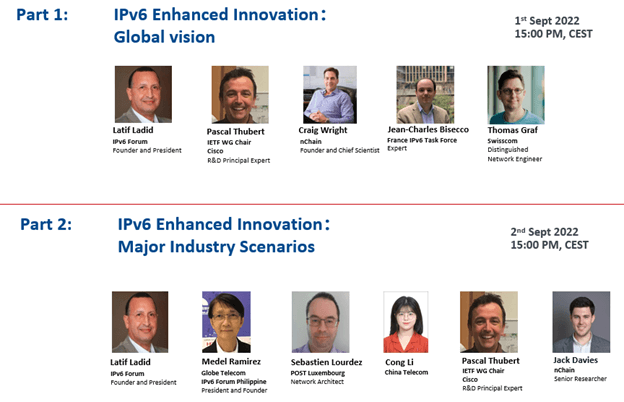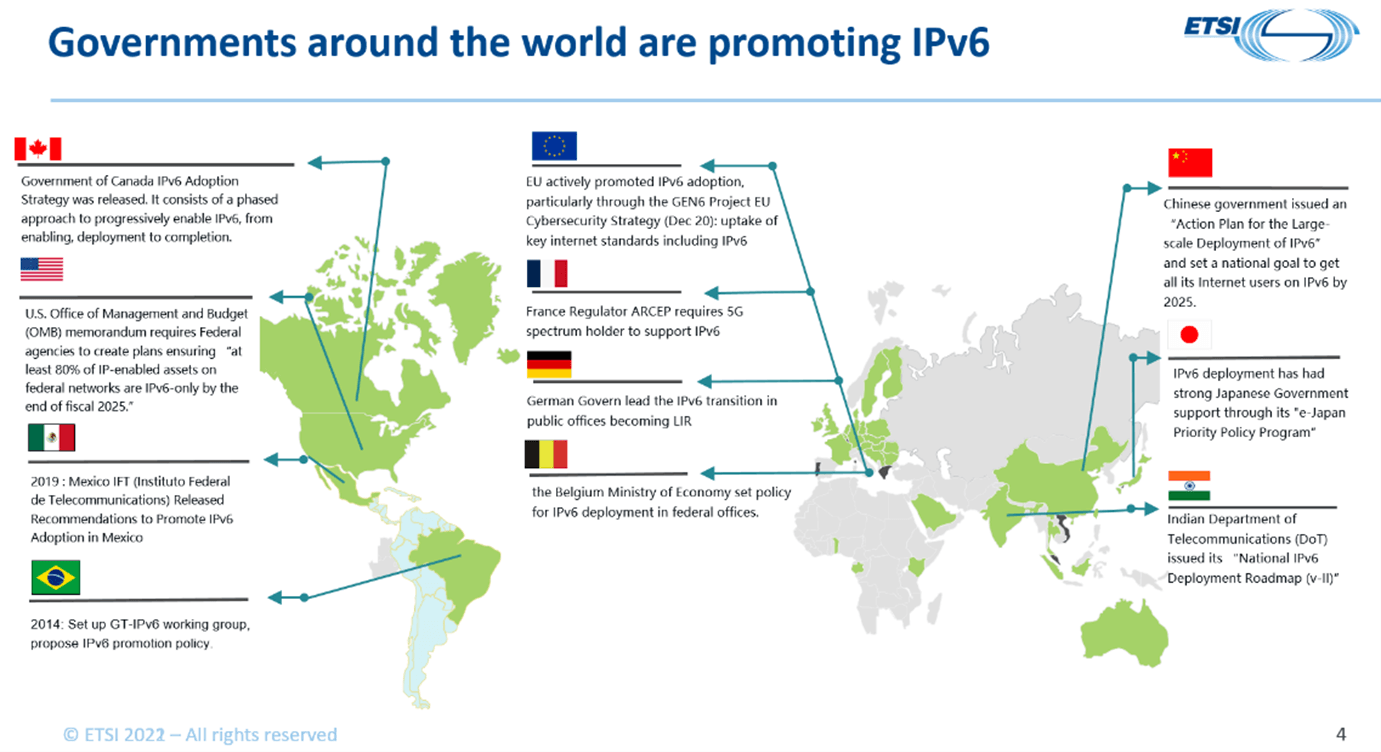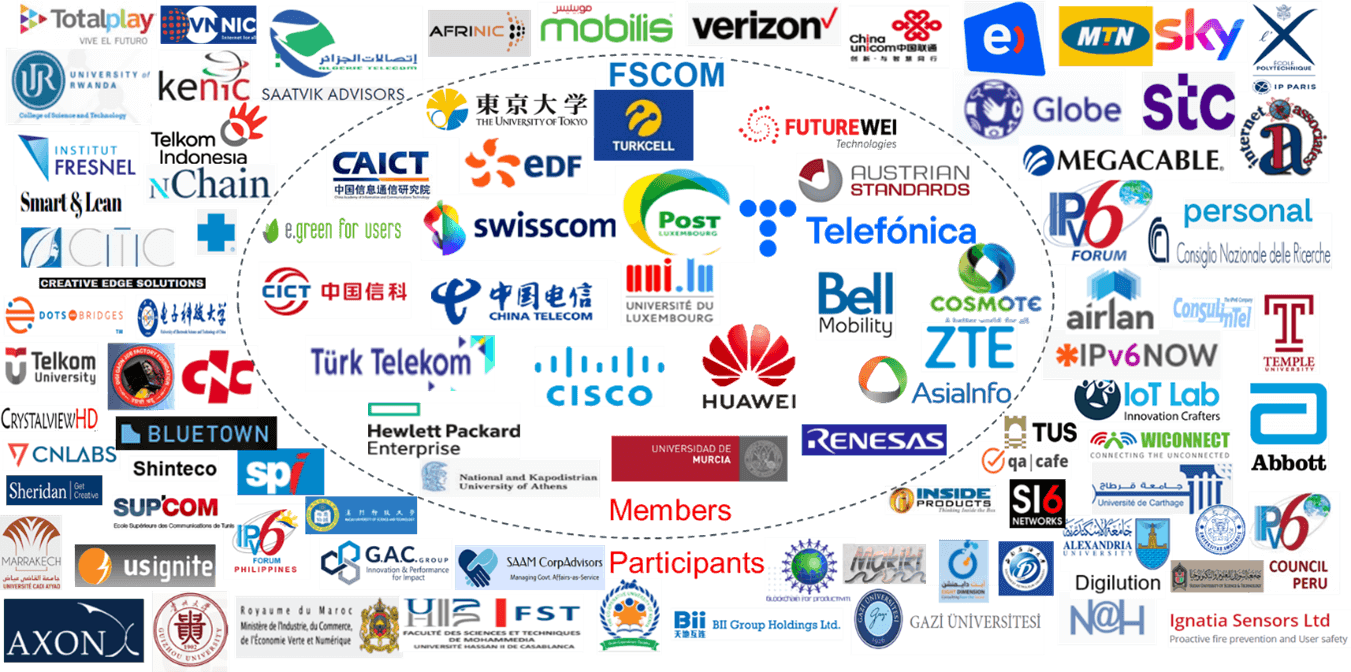2 ETSI webinars ‘IPv6 Enhanced Innovation Global Vision’ and ‘Major Industry Scenarios’ took place on September 1st and 2nd respectively. Experts from government institutions, operators, manufacturers and research institutes, shared their vision and the progress made to date within ETSI ISG (Industry Specification Group) IPE (IPv6 Enhanced innovation).

Approved by ETSI in October 2020, ETSI ISG IPE has the prime goal to produce best practices to promote global IPv6 adoption and describe emerging business scenarios to accelerate global IPv6 enhanced innovations.
The first webinar highlighted the value of IPv6 and Enhanced innovation (i.e. SRv6) has for industry, as well as the role the ISG in promoting their utilisation, aligning the industry and accelerating the adoption.
In the second webinar the accomplishments of the ETSI IPE work items were highlighted by their rapporteurs by exploring the identified target scenarios, i.e. 5G transport over SRv6, datacenter and Cloud Integration, Enterprise Networking and Blockchain.
Latif Ladid, ISG IPE Chair, reported on the main progress of the group, highlighting how IPv6 is the key ingredient for digital transformation. Many governments have IPv6 policies and recommendations, targeting equal opportunities to deliver and use internet services, to foster competitions and to enhance security.

Latif also announced that multiple PoCs (Proofs of Concept) activities are starting to verify the concepts formulated in several work items (both ongoing and published).
Pascal Thubert, Cisco & IETF 6TiSCH/LPWAN WGs chair stated that IPE is based on IETF standards, and it will not produce Internet protocol standards. He highlighted how the role of ETSI IPE in complementing IETF has been fully recognized, having cross references in their reciprocal work.
Craig Wright, Founder and Chief Scientist from nChain, underlined how Blockchain technology can be used to facilitate an inexpensive, secure, and transparent procedure for the purchase, integrity, and licensing of proprietary software. IPv6 is the perfect technology to underpin Blockchain functionalities providing the proper security.
Jean-Charles Bisecco, VeeSIX & France IPv6 Task Force, highlighted how ARCEP in France monitor IPv6 deployment by means of IPv6 barometer annual report, stimulating the industry to complete the transition towards IPv6, in agreement with EU’s IPv6 migration and open Internet strategy.
Thomas Graf, Swisscom, Distinguished Network Engineer, underlined how SRv6 is commonly standardized, network vendors implementations are available and network operators are at various stages in their deployments. SRv6 enhances the possibility to collect e2e data and monitor the network status as well for evolution towards digital twin.
Medel Ramirez, Globe Telecom & IPv6 Forum Philippine President and Founder, presented the “5G Transport over IPv6 and SRv6” Group Report. He stated that Segment Routing (SR) is a new technology developed to enable better control over the steering of IP packets across the network data plane. Through SRv6, applications such as network slicing and resource-based traffic steering can be realized.
Cong (Claire) Li, China Telecom, presented “IPv6-based Data Centers and Cloud integration” Group Report. IPv6 brings to cloud computing huge pool of addresses, which not only solves the problem of addresses shortage, but also brings advantages such as NAT avoidance. Together with AI management technologies, IPv6/SRv6 can match the agility in service creation and management currently available in the cloud environment.
Pascal Thubert, Cisco & IETF 6TiSCH/LPWAN WG chair, presented “IPv6-based enterprise networking and Industrial Internet” work item. He highlighted the unmatched benefits of IPv6, providing Enterprise Wide Address space enable flat routing, Address autoconfiguration (from non-DHCP source), Flow label, SRv6 steering / programming.
Jack Davies, nChain Senior Researcher, presented “IPv6-based Blockchain” group report. The IPv6 Cryptographic Generated Addresses (CGA) enable new functionalities for blockchain. CGA enable reciprocal authentication of two entities with no need for central authority. It enables to establish peer to peer services and to avoid man in the middle attach. Payment services sill gain from IPv6 functionalities.
ISG IPE has more than 100 supporters (ETSI members and non-members) from across the industry and across the world. Recently, a number of operators joined to contribute their experience and expectations, looking to clarify and evolve their IP transport strategy.
The IPE work programme currently consists of 14 group reports, 6 of which have already been published and are available via the IPE committee page.
